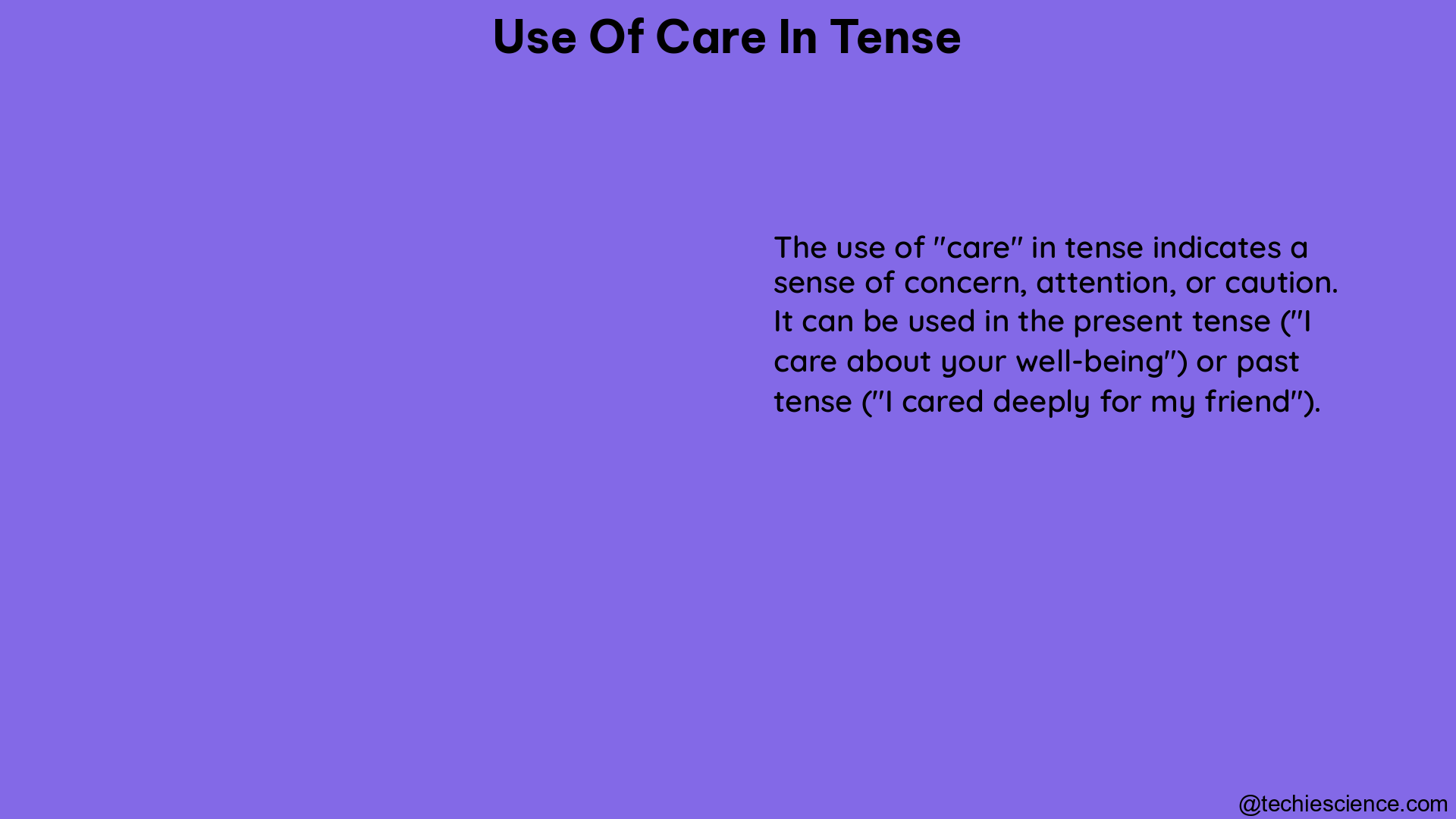The use of the verb “care” in different tenses is crucial for effective communication in English. This comprehensive guide will provide you with a deep understanding of how to properly use “care” in various tense forms, along with detailed examples and common errors to avoid.
The Base Form of “Care”
The base form of the verb “care” is simply “care.” This is the most fundamental form of the verb and is used in various tense constructions.
Present Tense

Present Simple
- I/You/We/They care: “I care about my family.”
- He/She/It cares: “She cares for her elderly neighbor.”
Present Continuous
- I am caring: “I am caring for my sick friend.”
- You/We/They are caring: “They are caring for the injured animals.”
- He/She/It is caring: “He is caring for his ailing grandmother.”
Present Perfect
- I/You/We/They have cared: “They have cared for the environment for many years.”
- He/She/It has cared: “She has cared for her children since they were born.”
Present Perfect Continuous
- I/You/We/They have been caring: “We have been caring for the elderly in our community.”
- He/She/It has been caring: “He has been caring for his sick father for the past few months.”
Past Tense
Past Simple
- I/You/He/She/It/We/They cared: “She cared for her sick brother during his illness.”
Past Continuous
- I/You/He/She/It/We/They was/were caring: “They were caring for the injured wildlife at the animal shelter.”
Past Perfect
- I/You/He/She/It/We/They had cared: “By the time I arrived, they had cared for the patient.”
Past Perfect Continuous
- I/You/He/She/It/We/They had been caring: “She had been caring for her elderly parents for several years before they passed away.”
Future Tense
Future Simple
- I/You/He/She/It/We/They will care: “I will care for my grandparents when they need assistance.”
Future Continuous
- I/You/He/She/It/We/They will be caring: “They will be caring for the sick children at the hospital.”
Future Perfect
- I/You/He/She/It/We/They will have cared: “By the end of the year, they will have cared for the environment in our community.”
Future Perfect Continuous
- I/You/He/She/It/We/They will have been caring: “By the time I retire, I will have been caring for my family for many years.”
Idiomatic Expressions with “Care”
“Take care of”
The phrase “take care of” means “to attend to or assume responsibility for.” Here are some examples:
- Present Simple: “I’ll take care of the groceries.”
- Past Simple: “She took care of her sister when their parents were away.”
- Present Perfect: “They have taken care of the project.”
- Future Simple: “He will take care of the arrangements for the event.”
Common Errors
“Taken cared of”
The phrase “taken cared of” is incorrect and should be replaced with “taken care of.” For example:
- Correct: “The children were taken care of.”
- Incorrect: “The children were taken cared of.”
References
- Preply. (2016, September 20). Past tense of care | Learn English. Retrieved from https://preply.com/en/question/past-tense-of-care
- CoolJugator. (n.d.). Take care conjugation in English in all forms. Retrieved from https://cooljugator.com/en/take%20care
- Verbix. (n.d.). English: take care of – Verbix verb conjugator. Retrieved from https://www.verbix.com/webverbix/english/take%20care%20of
- Jose Carillo Forum. (2017, January 18). The disturbing high incidence of the faulty “taken cared of” usage. Retrieved from https://josecarilloforum.com/forum/index.php?topic=6762.0
- WordReference. (n.d.). Conjugation of care. Retrieved from https://www.wordreference.com/conj/enverbs.aspx?v=care
Hi… I am Sowndharya Jagadeeswaran, a university rank holder in M.A. English Literature. I have also done my master’s in Business Administration. Inquisitive as I am, my interest in action-oriented research helped me publish research papers in reputed journals. Now, as a career, I am an instructor where I teach young and adorable students the intricate technicalities of Public Speaking and Creative Writing. I also enjoy writing articles on topics I specialize and research in.
You can connect with me through LinkedIn.-